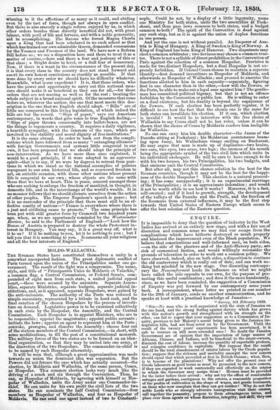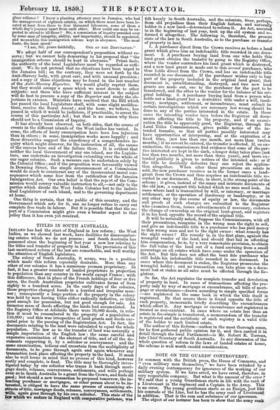ENQUIRE.
IT is impossible to deny that the question of industry in the West Indies has arrived at an entirely new stage, and with a fair use of discretion and common sense we may find our escape from the complications which have hitherto destroyed so much property and hindered the improvement even of the Ina& population. We believe that conscientious and well-informed men, on both sides, —on the side of the planters and of the Anti-Slavery party, are sick of economical faction, and would willingly reconsider the grounds of toleration in order to work out a common policy. We have observed, indeed, also on both sides, a disposition to continue the old controversy which is really out of date, and can work no- thing but mischief in the new stage. Our dissenting contempo- rary the Nonconformist lends its influence on what we might. have called the side opposite to our own, for the purpose of pro- moting this useful combination ; and does it the more handsomely, since, as we have been reminded, the suggestion of a Commission of Enquiry was put forward by our contemporary some years back. A correspondent, whose letter we printed in our number for the 29th of January, sends us another communication, and he speaks at least with a practical knowledge of Jamaica— "Surrey, 9th February 1859.
" Sne—No man who is well acquainted with the state of Jamaica on the one hand, and the strong feeling against slavery which has grown with this nation's growth and strengthened with its strength on the other, can fail to regret that your suggestion as to a Commission of In- quiry, previous to her Majesty's assent being given to the Jamaica im- migration bills, had not been acted on by the Government. Until the result of the twenty years' experiments has been ascertained, is it safe to venture on still more extended ones ? No doubt the Jamaica Government are of opinion that the importation of large masses of Africans, Chinese, and Indians, will be beneficial to the estate-owners, diminish the cost of labour, increase the quantity of exportable produce, and rein.spire confidence in capitalists. But suppose that the result should be the total abandonment of estates labour by the Creole popula- tion; suppose that the sickness and mortality amongst the new c,omerS should equal that which prevailed at first in British Guiana ; what, then, is to become of the plantations ? Why not offer the present rack of Creole labourers as good terms as must be presented to the new comers, if they are expected to work contentedly and effectively on the estates to which the Governor may assign them? Houses must be provided for the latter before their arrival : why not try the effect of comfortable cottages and gardens, contiguous to the estates, a reasonable proportion of the profits of cultivation in the shape of wages, and gentle treatment, on those who now complain that they can get neither ? Why do not the noble Lords who so strongly advocate immigration visit their estates. call together the peasantry, propose to them advantageous terms, and place over them agents on whose discretion, integrity, and skill, they can
place reliance ? I knew a planting attorney once in Jamaica, who had the management of eighteen estates, on which there must have been lo- cated at least from three to four thousand labourers, some of them a
whole day's journey apart from each other: inquiry could one man be ex-
pected to attend to all these ? Sir, a commission of presided over by some man of integrity, ability, and impartiality, should be appointed, and meanwhile this immigration scheme kept in abeyance. 'The most haste, the least speed.'
"I am, Sir, yours faithfully, ONE OF TILE DEPUTATION."
We adopt half of our correspondent's proposition without re- serve ; but we cannot help demurring to his proposal that "the immigration scheme should be kept in abeyance." Prim& facie, the authority of the local Legislature must be regarded as suffi- cient. We do not pretend that no objections have been urged to the Jamaica bill ; on the contrary, they were set forth by the Anti-Slavery body, with great care, and with unusual precision ; and a copy of those objections may be found in the last number of the Anti-Slavery Reporter. We would gladly reprint them, but they would occupy a space whioh we must devote to other subjects : and those who have sufficient interest in the subject will do best to procure a copy of the Reporter and study the ob- jections in extenso. Ministers have resolved that the Bill which has passed the local Legislature shall, with some slight modifica- tions, receive the Royal Assent ; and the hour, we believe, has passed in which it would be judicious, if practicable, to arrest the course of this particular Act ; but that is no reason why there should not be a Commission of Inquiry.
It has already been observed, on both sides, that the course of events in the different islands of the West indies has varied. In some, the effects of hasty emancipation have been less injurious than in others ; in some, immigration works more happily ; and these diversities suggest the expediency of a comprehensive in- quiry which might discover, for the instruction of all, the causes of the success here and of the failure there. It is evident that neither the local Government of any one island, nor the Legisla- ture, can undertake an investigation extending over the whole of our sugar colonies. Such a measure can be undertaken solely by the Colonial Office ; and if the proposition were favourably viewed in Downing Street, the simple announcement of a Commission would do much to counteract any of the inconvenient moral con- sequences which some fear from the ratification of the Jamaica Immigration Act. Our own belief is that the reptxt of the Com- mission would convey valuable instruction to all,—not only to the parties which divide the West India Colonies but to the indivi- dual Legislature of each island, and to the governing department at home.
One thing is certain, that the public of this country, and the Government which acts for it, can no longer refuse to carry out complete free trade in labour. But it is possible that that the re- port of a Commission might give even a broader aspect to that policy than it has even yet received.



































 Previous page
Previous page